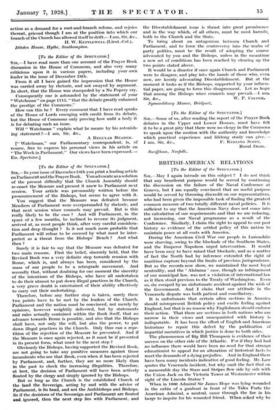[To the Editor of the SPECTATOR.] SIR,—In your issue of
December 24th you print a leading article on'Parliament and the Prayer Book. You advocate as a solution of the present difficulty that the Church Assembly should re-enact the Measure and present it anew to Parliament next session. Your article was presumably written before the pronouncement of the Bishops, but seems to agree with it.
You suggest that the Measure was defeated because Members of Parliament were overpersuaded by rhetoric, and that next 'session wiser counsels may prevail. But is this really likely to be the case ? And will Parliament, in the space of a few months, be inclined to reverse its judgment, arrived at, as most people think, after very careful considera- tion and deep thought ? Is it not much more probable that Parliament will refuse to be coerced by what Must be inter- preted as a threat from the Bishops' Bench ? And what then ?
Surely it is fair to say that the Measure was defeated for two main reasons. First the belief, sincerely held, that the Revised Book was a very definite step towards reunion with Rome, which is, and always has been, considered by the mass of our people to be a retrograde movement. And secondly that, without doubting for one moment the sincerity of the intentions of the Bishops, who have all undertaken to do their utmost to put down illegal practices in the Church, a very grave doubt is entertained of their ability effectively to carry out their undertaking.
Therefore, before any further step is taken, surely these two points have to be met by the leaders of the Church. Parliament and the nation must be convinced, not merely by opinions, however weightily delivered, but by statements and rules actually contained within the Book itself, that no advance towards Rome is possible, and also that the Bishops shall have, not only the will, but also the power, to put down illegal practices in the Church. Only thus can a .repe- tition of the rejection of the Measure be prevented. And if the Measure is once again rejected, as it must be if presented in its present form, what must be the next step ?
Obviously the Bishops, having supported the Revised Book, are not going to take any punitive measures against those incumbents who use that Book, even when it has been rejected by Parliament, and, further, they are no more likely than in the past to check the increasing illegalities. Therefore, at best, the decision of Parliament will have been actively flouted by the clergy and simply ignored by the Bishops.
But so long as the Church is the established Church of the land the Sovereign, acting by and with the advice of Parliament, is its head, and not the Archbishops and Bishops. So if the decisions of the Sovereign and Parliament are flouted and ignored, then the next step lies with Parliament, and
the Disestablishment issue is thrust into great prominence and in the way which, of all others, must be most harmfu, both to the Church and the State.
To bring about an antagonism between Church and Parliament, and to force the controversy into the 'realm of party politics, must be the result of adopting the course advocated by you and the Bishops, unless in the meantime a new set of conditions has been reached by clearing up the two points stated above.
It would be a disaster if once again Church and Parliament were to disagree, and play into the hands of those who, even now, are keenly advocating Disestablishment. But at the moment it looks as if the Bishops, supported by your influen- tial paper, are going to force this disagreement. Let us hope that among the Bishops wiser counsels may prevail.—I am, Sir, &c., W. P. Cor.rox. Symondsbury Manor, Bridport.






































 Previous page
Previous page